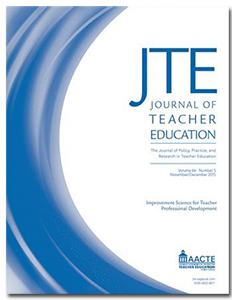JTE Author Interview: Facilitating Teacher Learning With Different Representations of Practice
Have you seen the JTE Insider blog managed by the Journal of Teacher Education (JTE) editorial team? Check out the latest author interview below.

This interview features insights from the JTE article, “Facilitating Teacher Learning When Using Different Representations of Practice,” written by Gloriana González, Jason Deal, and Lisa Skultety of the University of Illinois at Urbana-Champaign. The article is featured in the November/December issue of JTE; you can read the article by going to this link.
Q: What motivated you to pursue this particular research topic?
A: Facilitation is essential for promoting teacher learning in professional development. However, it has not been studied enough. Recent work has provided new insights about the work involved when facilitating teacher discussions for learning in professional development, especially in relation to using video. We were interested in learning whether and how using animations would require different facilitation skills than when using video. A better understanding of facilitation in the context of a professional development model that combines videos and animations will support the process of capacity building of teacher leaders who can facilitate professional development.
Q: Were there any specific external events (political, social, economic) that influenced your decision to engage in this research study?
A: The availability of new technologies for creating representations of teaching, such as animations, opens opportunities for professional developers to broaden the resources for promoting teacher learning. Additionally, some districts are assuming more control of professional development. Making available new knowledge about strategies for facilitation would support the implementation of high-quality professional development in such settings.
Q: What were some difficulties you encountered with the research?
A: Initially, we were building our own framework for facilitation, but then a framework for facilitation with video by van Es et al. (2014) was published. We found the framework useful and decided to expand it to include facilitation using animations. Adapting the framework to the context of a professional development model that combined video clubs, animation discussions, and lesson study required us to refine the definition of some moves and practices in relation to the learning goals of the professional development program.
Q: Writing, by necessity, requires leaving certain things on the cutting room floor. What didn’t make it into the article that you want to talk about?
A: We wanted to study facilitation across video clubs, animation discussions, and lesson study. However, we realized that the nature of the facilitation of lesson study components was significantly different than the facilitation of videos or animations. So the facilitation of the lesson study process required further examination, and this is something that we want to study in the future.
Q: What current areas of research are you pursuing?
A: Our work focuses on the study of teaching and teacher learning through professional development. We are interested in studying the effects of the combined professional development model, using lesson study, video clubs, and animation discussions, in promoting teacher learning.
Q: What new challenges do you see for the field of teacher education?
A: One challenge is how to provide high-quality professional development that accommodates to the contextual challenges in schools and districts. Research shows that professional development should involve sustained and meaningful opportunities for teachers to examine their own practice in relation to opportunities to promote student learning. However, teachers in school face multiple demands and, at times, professional development is not embedded within their workday. Teacher education needs to examine alternatives to high-quality professional development while, at the same time, making policy makers aware of the need to support teachers’ professional growth.
Q: What advice would you give to new scholars in teacher education?
Gloriana González: Keep in mind your teaching experiences and your experiences with teachers. Your voice as a scholar is important and unique because it is shaped by those experiences.
Jason Deal: Be involved in doing as much research as you can as soon as you can. I felt so confused about what research was like until I was able to actually do it and understand the purpose of each component!
Lisa Skultety: Just as we know that collaboration is important for learning in teacher education, it is also a critical part of our development as new scholars. Embrace collaborating and learning from those around you, especially including the teachers that you work with. It not only helps you to grow, but also keeps you grounded in the realities of the classroom.






